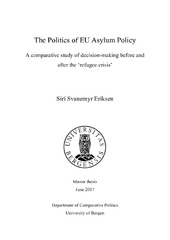| dc.description.abstract | This thesis is concerned with explaining the development of EU asylum policy. The research question – How did the refugee crisis affect EU decision-making in asylum policy? – Is answered by deploying a new theoretical framework. Through a comparative case study using qualitative methods such as elite interviews and document analysis, the thesis demonstrates that when the centrality of asylum policy (its salience) increases, we observe restrictions on the political maneuvering of EU institutions, thereby making it harder to find sustainable common solutions. There is a gap in the literature when it comes to understanding decision-making in the area of asylum policy. By combining elements drawn from a variety of studies of national- and European decision-making, I have developed a new theoretical argument which I call the Salience Model. The model is tested through a comparative case study of the decision-making on asylum policy before and after the refugee crisis. The empirical findings are twofold. First, the autonomy of the Commission to propose legislation depends on salience. When there is low salience, the Commission proposes legislation supporting the rights and safeguards of the asylum seekers, which is also favored by the European Parliament. When salience increases, the Commission is put under political pressure by the Council’s member states, resulting in a policy that is more focused on immigration concerns rather than the rights of asylum seekers. Secondly, the analysis shows that the member states’ positions in negotiations vary according to salience. The positions of member states in the Council before the ‘refugee crisis’ were in accordance with the preferences of the North-Western member states. By contrast, following the ‘refugee crisis’, all member states have an enhanced interest in pursuing their national political preferences, thereby making it much harder to reach an agreement. In sum, high salience, resulting from the refugee crisis, makes it harder to reach an agreement regarding asylum policy precisely when the importance of reaching such a common solution is greatest. | en_US |
